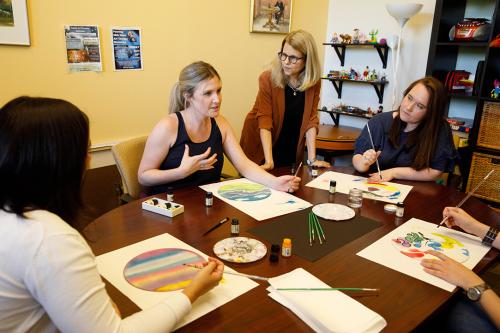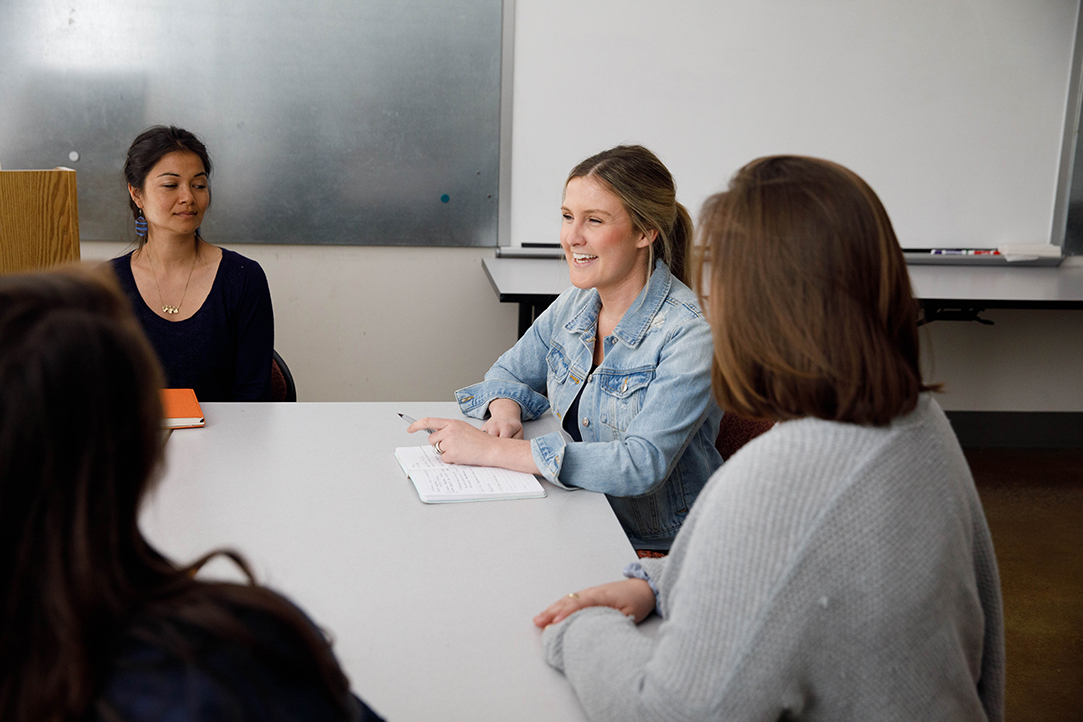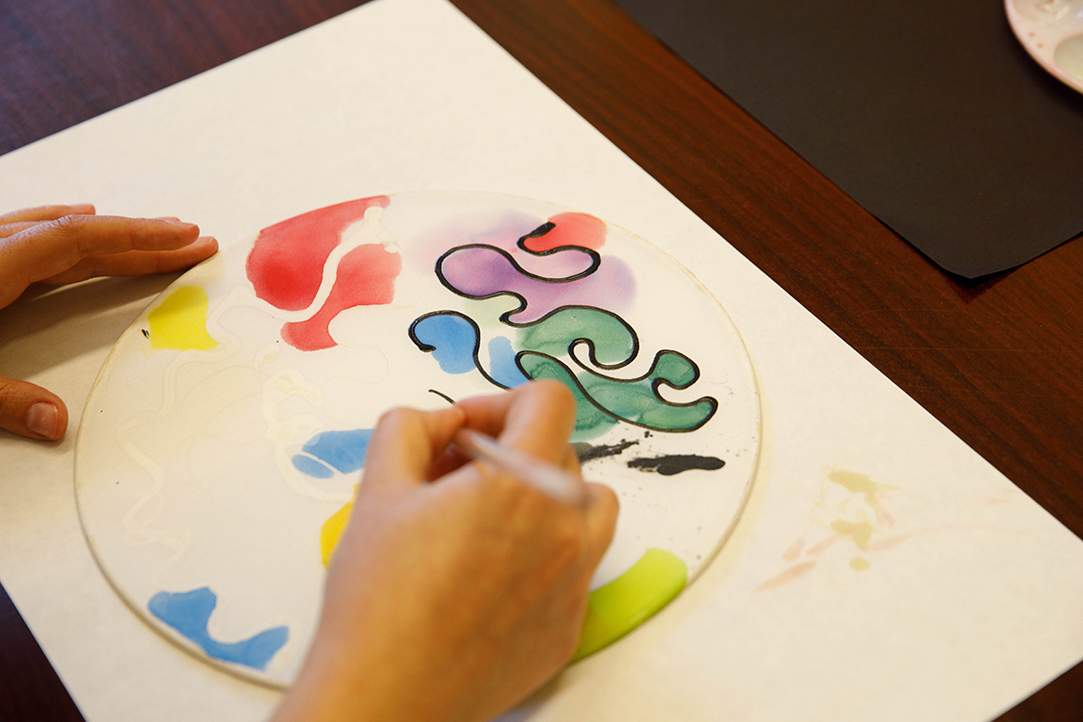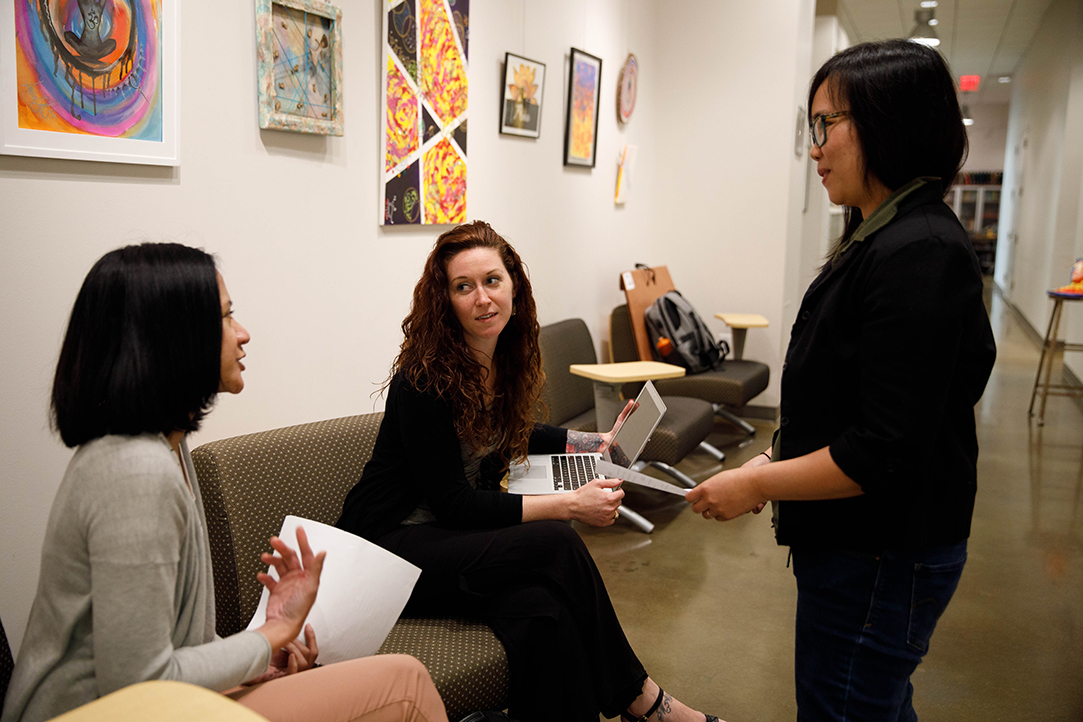MA in Art Therapy
In the Master of Arts in Art Therapy, students learn to become art therapists positioned for careers in schools, health care institutions, research centers and more. Under the mentorship of faculty who are all credentialed art therapists, students explore their artistic identity, as well as the varying aspects of art therapy, trauma training, diagnosis and assessment. The curriculum also builds a theoretical foundation in individual, family and group counseling, psychopathology and human development.
By the end of the program, students complete nearly 1,000 hours of required internship, and they have the option to deepen their focus on an area with a thesis. Graduates leave prepared to earn professional licensure in art therapy and counseling.
Application Deadline
Rolling applications: November 15 to February 1 (recommended deadline of January 5 for scholarship and funding applicants)
Note: All students begin the program in the fall semester. Online programming is not available.
Program Highlights
Clinical Training
Our students regularly cite their experience in the GW Art Therapy Clinic as one of the major advantages of the program and as a central factor in the development of their art therapist identity. Students serve a wide range of clients and hone their clinical and case management skills. Sessions are videotaped and reviewed by the student and their small case consultation group. Clinical internship options include individual, group and family art therapy; diagnostic assessments; and other expressive therapies such as dance, music and movement.
Professional Licensure
The program requires students to complete 900 internship hours, 400 of which are direct client contact. Many of those 900 hours may be applied toward the hours required for earning the title of Registered Art Therapist with the Art Therapy Credentials Board (in states that provide licensure). Applicants for licensure must complete the required hours before applying to sit for the licensure exam and become Board Certified Registered Art Therapists (ATR-BC).
Clinical and Artistic Balance
The program incorporates demanding coursework, internships at partner organizations and experience working with clients in the clinic. Every class integrates art techniques including printmaking, clay sculpture, watercolor, batik and collage. Student artists display their artwork in regular exhibits in the program’s contemporary gallery space. View samples of recent student artwork. View gallery blog.
Trauma Training
All students in the master’s program complete trauma training, an essential skill for future art therapists, in their second year. Students study trauma theories and techniques in the classroom and then apply those lessons to real-life client work, working individually with clients in our on-site GW Art Therapy Clinic and consulting on cases with experienced therapists.
“In class, I was asked to create a symbol that has meaning to me by using printmaking materials. This was a kinesthetic experience for me as I carved out the block, rolled the paints and pressed the block onto the paper. I found the process therapeutic and calming. I hope to use this type of art-making to expand my future clients’ motor and creative capabilities.”
Ashley Rivera
MA '20
Course Requirements
Optional Thesis: Master’s students may choose to complete a thesis based on original research. Students apply for the thesis option after their first semester and register for a three-credit Thesis Research course.
The following requirements must be fulfilled:
The general requirements stated under Columbian College of Arts and Sciences, Graduate Programs.
61 credits in required coursework, including 900 internship hours.
| Code | Title | Credits |
|---|---|---|
| Required | ||
| ARTH 6205 | History and Theory of Art Therapy | |
| ARTH 6207 | Human Development and Art Therapy I: Child and Adolescent | |
| ARTH 6208 | Human Development and Art Therapy II: Adults and Senior Adults | |
| ARTH 6210 | Counseling/Art Therapy Process | |
| ARTH 6211 | Process of Counseling and Art Therapy: Theory | |
| ARTH 6212 | Creativity, Symbolism, and Metaphor | |
| ARTH 6221 | Studio/Technique of Art Therapy | |
| ARTH 6233 | Marital and Family Art Therapy/Counseling | |
| ARTH 6234 | Group Process | |
| ARTH 6235 | Social and Cultural Diversity | |
| ARTH 6241 | Assessment Procedures | |
| ARTH 6242 | Psychopathology: Art and Diagnosis | |
| ARTH 6243 | Substance Abuse and Addictions | |
| ARTH 6251 | Research Methods | |
| ARTH 6262 | Career Counseling and Art Therapy | |
| ARTH 6263 | Ethics and Professionalism I: Principles | |
| ARTH 6264 | Ethics and Professionalism II: Applications | |
| ARTH 6265 | Advanced Issues in Psychotherapy and Art Therapy (taken four times for 1 credit for a total of 4 credits) | |
| ARTH 6271 | Art Psychotherapy and Trauma I: Theory and Approaches to Treatment (taken for 3 credits) | |
| ARTH 6272 | Art Psychotherapy and Trauma II: Loss, Countertransference, and Resiliency | |
| ARTH 6281 | Practicum in Art Therapy (taken six times for 1 credit for a total of 6 credits) | |
| ARTH 6292 | Special Projects in Art Therapy (taken for 1 credit) | |






